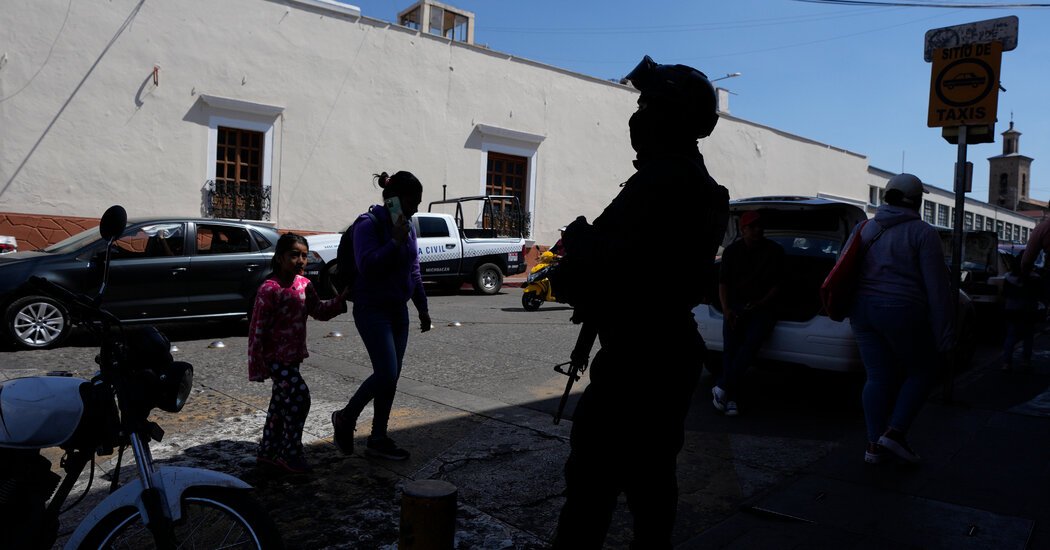One candidate was shot multiple times as he worked out at the gym. Another died after gunmen opened fire during her campaign rally. A third was walking the streets with her supporters when gunfire broke out.
Across Mexico, dozens of candidates, their relatives and party members have been targeted in violent attacks ahead of next month’s general election, which will be the country’s largest election ever in terms of voters and seats. At least 36 people seeking office have been killed since last June, a New York Times analysis found.
It’s a gruesome milestone even for Mexico, where violence has been a part of campaign seasons for decades.
Why is election violence so bad?
The surge in violence plaguing Mexico can largely be traced to local criminal groups, according to security analysts and law enforcement officials.
The fracturing of Mexico’s larger organized crime syndicates has given rise to rival gangs locked in fierce battles for power and territory. In their quests for dominance, these gangs have resorted to co-opting and intimidating the authorities to exert control over communities — an attempt to secure protection, obtain valuable information and grow their operations.
A sharp increase in violence during elections is not unusual in Mexico. In the last election cycle, in 2021, when voters across the country cast ballots for more than 19,900 local posts, at least 32 candidates were killed, according to a study published by the College of Mexico, a university in Mexico City.
“It’s about warning the other candidates to lower their profile, you know? A reminder that they’re not in charge,” said Manuel Pérez Aguirre, a political scientist who cowrote the study. “And also to citizens, so they know that there’s someone watching. It’s a democracy. But it’s a surveilled democracy.”
The expanding violence can also be attributed in part to the scale of the election and the vast number of candidates: With over 20,000 local positions up for grabs, and more than 600 at the federal level, this year’s election is the largest in Mexico’s history.
Why are candidates being killed?
It’s hard to pinpoint exactly why certain candidates have been targeted. Many of the political assassinations from the past year and previous election cycles remain unsolved.
Officials say a few killings were more criminal or personal in nature. A car theft gone wrong. A fight with a family member that ended tragically.
But The Times found that there was suspected involvement of organized crime groups in at least 28 of the 36 candidate killings in this campaign season, according to statements by local law enforcement authorities, party leaders and local news coverage. Heightening the sense of terror, not only candidates but their family members are being targeted, with at least 14 such relatives killed in recent months.
Why have local candidates been targeted the most?
For cartels, influencing politics is done most effectively at the local level.
“Structurally, it is the most vulnerable, the weakest, the one with the least resources, the one with the least institutional strength,” said Arturo Espinosa, the director of Electoral Laboratory, a Mexican research group focused on democracy, which has so far documented 272 cases of election violence across the country — including killings, threats, abductions and attacks.
The trend speaks to the aims of organized crime groups to become de facto rulers of towns across Mexico, mostly for economic reasons.
“It’s about being able to infiltrate municipal governments, capturing government resources, having access to information that is crucial to their operation, seizing control of security forces,” said Sandra Ley, a security analyst with the public policy group Mexico Evaluates.
What is the government doing to quell the violence?
In response to the killings, the country’s electoral agency has coordinated with federal security forces, like the army and the National Guard, to provide protection to candidates who request it. This past week, Mexican officials said that security forces were providing protection to 487 candidates.
State governments are also deploying state and municipal police officers to keep dozens of local candidates safe. But a lack of resources, bureaucratic hurdles and a weakened local police have made it difficult to keep organized crime at bay. “Many of these authorities have been left vulnerable,” Ms. Ley said.



